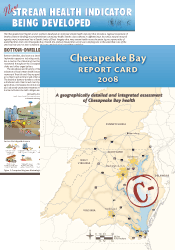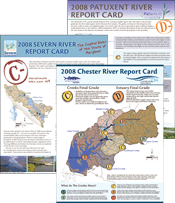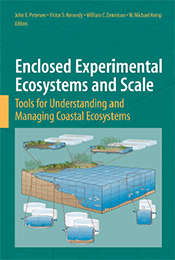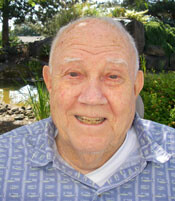Course in Communicating Science Effectively
The Integration and Application Network is conducting a 3-day course in communicating science effectively. The course is being held in Cambridge, Maryland, 5-7 May, 2009. The hands-on approach means that participants come away from the course with the technical skills to effectively communicate scientific information in a variety of communication products. Further details and online registration are available on the course website.Chesapeake Bay Report Card and Stream Health Newsletter
 The aim of this report card is to provide a transparent, timely, and geographically detailed assessment of 2008 Chesapeake Bay health. Three water quality and three biotic indicators are combined into one overarching Bay Health Index, which is presented as the report card score. The overall health of Chesapeake Bay was poor in 2008, obtaining a grade of C-. Health of the 15 individual reporting regions varied, ranging from B- (moderate-good) to F (very poor). Additionally, for the first time, scientists present a snapshot of ecological conditions in the freshwater streams and rivers that feed the Bay. This new stream health indicator is a first step in evaluating the health of the Chesapeake Bay watershed. The Bay-wide report card production is supported by Eco-Check, a NOAA-UMCES partnership. The stream health indicator newsletter was produced with Chesapeake Bay Program partners and the U.S. Geological Survey.
The aim of this report card is to provide a transparent, timely, and geographically detailed assessment of 2008 Chesapeake Bay health. Three water quality and three biotic indicators are combined into one overarching Bay Health Index, which is presented as the report card score. The overall health of Chesapeake Bay was poor in 2008, obtaining a grade of C-. Health of the 15 individual reporting regions varied, ranging from B- (moderate-good) to F (very poor). Additionally, for the first time, scientists present a snapshot of ecological conditions in the freshwater streams and rivers that feed the Bay. This new stream health indicator is a first step in evaluating the health of the Chesapeake Bay watershed. The Bay-wide report card production is supported by Eco-Check, a NOAA-UMCES partnership. The stream health indicator newsletter was produced with Chesapeake Bay Program partners and the U.S. Geological Survey.
Individual tributary report cards produced for the Chester, Patuxent, and Severn Rivers
 UMCES researchers worked with local Riverkeeper organizations to produce river-specific report cards for the Chester, Patuxent, and Severn Rivers. These reports, funded by the Chesapeake Bay Trust and supplemented by data collected by citizen scientists, are designed to provide the organizations with a new set of tools to better track local ecosystem health of their waterways and report them to their communities. The Chester River estuary received a D, the Patuxent River a D-, and the Severn River a C-.
UMCES researchers worked with local Riverkeeper organizations to produce river-specific report cards for the Chester, Patuxent, and Severn Rivers. These reports, funded by the Chesapeake Bay Trust and supplemented by data collected by citizen scientists, are designed to provide the organizations with a new set of tools to better track local ecosystem health of their waterways and report them to their communities. The Chester River estuary received a D, the Patuxent River a D-, and the Severn River a C-.
Enclosed Experimental Ecosystems and Scale: Tools for Understanding and Managing Coastal Ecosystems published
 The environmental challenges now facing humanity, ranging from climate change to urbanization to invasive species to agricultural and industrial pollutants, are particularly acute in the coastal zone. Research in this region and in other aquatic ecosystems is complicated by interactions that occur over broad scales of time, space, and ecological complexity. Enclosed experimental ecosystems (mesocosms and microcosms) have become critical research tools because they provide a degree of control not achievable through field experiments. IAN Science Communicators Joanna Woerner and Tracey Saxby worked with the 22 current or former UMCES authors and editors to design this richly illustrated book. Available from Springer Press, it provides scientists, resource managers, and students with a comprehensive and practical guide and reference for improving the design and interpretation of research conducted in experimental ecosystems.
The environmental challenges now facing humanity, ranging from climate change to urbanization to invasive species to agricultural and industrial pollutants, are particularly acute in the coastal zone. Research in this region and in other aquatic ecosystems is complicated by interactions that occur over broad scales of time, space, and ecological complexity. Enclosed experimental ecosystems (mesocosms and microcosms) have become critical research tools because they provide a degree of control not achievable through field experiments. IAN Science Communicators Joanna Woerner and Tracey Saxby worked with the 22 current or former UMCES authors and editors to design this richly illustrated book. Available from Springer Press, it provides scientists, resource managers, and students with a comprehensive and practical guide and reference for improving the design and interpretation of research conducted in experimental ecosystems.
Nelson Marshall
 Nelson Marshall, a former Professor of Oceanography and Marine Affairs at the University of Rhode Island, passed away March 25, 2009, at the age of 94 in Portland, Oregon. Nelson received his PhD at the University of Florida in 1941 and had an active career at multiple institutions, chronicled in his book "In the Wake of a Great Yankee Oceanographer". During his retirement, Nelson maintained an active interest in oceanography first at Horn Point Laboratory, University of Maryland Center for Environmental Science and then at Oregon State University. Nelson wrote a series of books, and his final book "Oceanography: An Observer's Guide" will be released shortly through IAN Press. Contact details for his family can be obtained via ian@umces.edu.
Nelson Marshall, a former Professor of Oceanography and Marine Affairs at the University of Rhode Island, passed away March 25, 2009, at the age of 94 in Portland, Oregon. Nelson received his PhD at the University of Florida in 1941 and had an active career at multiple institutions, chronicled in his book "In the Wake of a Great Yankee Oceanographer". During his retirement, Nelson maintained an active interest in oceanography first at Horn Point Laboratory, University of Maryland Center for Environmental Science and then at Oregon State University. Nelson wrote a series of books, and his final book "Oceanography: An Observer's Guide" will be released shortly through IAN Press. Contact details for his family can be obtained via ian@umces.edu.

